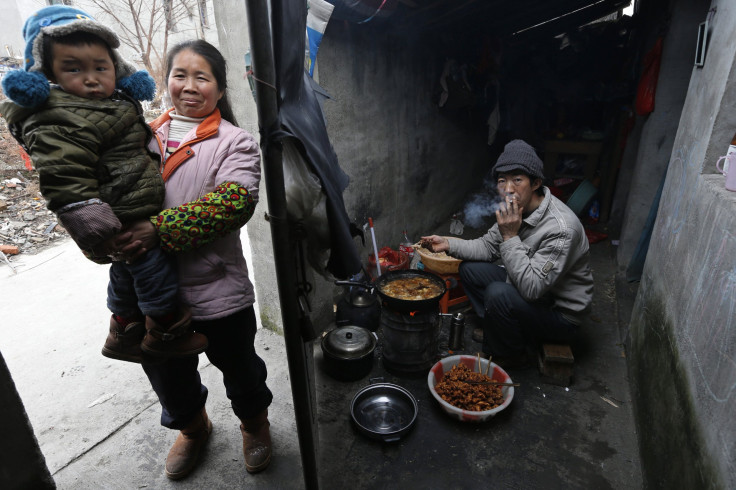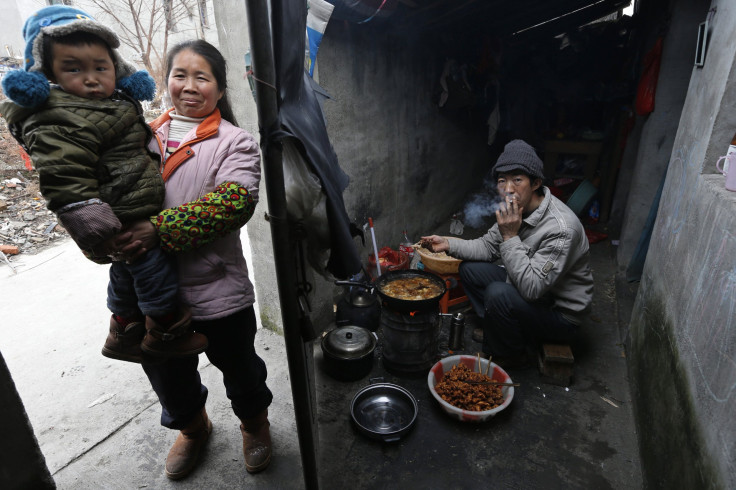The Bottom Of Chinese Society: Migrant Workers And Their Temporary 'Marriages'

“Temporary Marriage” has become a much-discussed concept in Chinese media recently, referring to migrant workers who are separated from their families, and out of necessity form a temporary, often extramarital, “marriage” with other migrant workers in cities across China.
The concept was brought up during the Communist Party's National People’s Congress last November, according to CQ News, a Chinese news website. Migrant workers, usually farmers who seek work in cities for better pay, are a large part of China’s workforce, predominantly in construction. Smaller cities and towns offer little employment opportunities. As a result, hordes of migrant workers congregate in large cities, often living in poor conditions in the hope of making a better living for their families.

Most migrant workers work as laborers, and are paid relatively little. The cost of living in a city, alone or with family, is also prohibitively high for migrant workers. In addition, it is exceedingly difficult for people not holding the so-called Hukou, or registration as a local resident in a city, which gives access to all social welfare in China, to receive medical care, social security, and for their children to attend school.
With such difficulties, usually a spouse must stay behind to watch the children and care for the elderly, while the other earns money in a city.
Ningbo is one of the largest cities in Zhejiang province, with 4.3 million outsiders, or as much as 43 percent of the city’s total population. In some areas of the city, outsiders outnumber locals.
Li Juan, a worker from Jiangxi province, is a waitress in Ningbo. She is living with a man who is not her husband. Li’s husband works in Henan province. They see each other once a year, during Chinese New Year. Their son is in high school and is able to take care of himself, so Li left to work in Ningbo. Her family is lucky to be supported by two incomes, but being so far away from them has made her life in the city lonely.
When Li first arrived in Ningbo, she rented a small room with Guo Liang, another migrant worker from her hometown. Their room was converted from a storage unit, and had two beds. Li hung a bedsheet between their beds as separation.
For Li, emotional needs are more urgent than physical needs.
“Work in the city is actually easier than farm work back home,” Li said. “But it’s the hardest at night, when there isn’t anyone to talk to.”
Guo Liang has a wife and a child in the country, just like Li. They were cordial when they first became roommates, but did not want to appear too intimate, both being married.
Sometimes, to be nice, Li would make extra food for Guo when cooking dinner. It was a generous and comforting gesture for Guo, who has been working in the city for several years by himself, and usually works late.
Many migrant workers do not have legal working contracts, so they are not properly protected under labor laws. They often work long days, seven days a week. Some choose to do that in order to earn more.
Last year for the Mid-Autumn Festival, Guo’s factory gave out boxes of Zongzi, a type of rice ball. After work, he bought more food and beer to share with Li.
When Li finally got off work at 9, she was greeted with a heartwarming scene of Guo waiting for her with hot food.
That night, the two of them drank beer, and talked. When Li got up to go to bed, Guo hugged her from behind.
Li cried the next morning, feeling guilty for betraying her family, but the next day and every day after, her own bed remained empty.
“It would be a lie to say I don’t have needs,” Li said.
Li and Guo live together as any married couple would, but perhaps not with as much emotional investment.
Whenever she calls home, Guo would walk out of the room to give her some privacy. She does the same for him. For Chinese New Year, each returns home to celebrate with their real family, then comes back into the city to their home together. Li knows it’s wrong, but feels it is difficult to break off their relationship.
“I feel more at ease only when I’m sending money to my son every month,” Li said, according to CQ News. “I feel real happiness.”
© Copyright IBTimes 2024. All rights reserved.





















